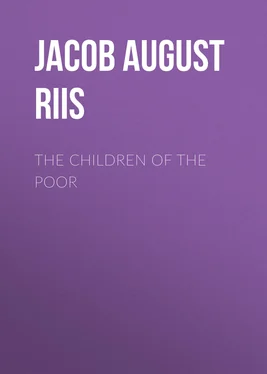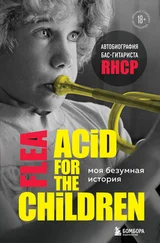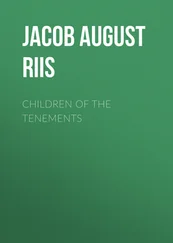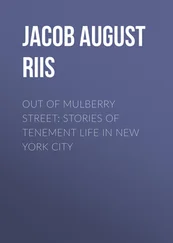Jacob August Riis - The Children of the Poor
Здесь есть возможность читать онлайн «Jacob August Riis - The Children of the Poor» — ознакомительный отрывок электронной книги совершенно бесплатно, а после прочтения отрывка купить полную версию. В некоторых случаях можно слушать аудио, скачать через торрент в формате fb2 и присутствует краткое содержание. Жанр: foreign_prose, sociology_book, foreign_antique, на английском языке. Описание произведения, (предисловие) а так же отзывы посетителей доступны на портале библиотеки ЛибКат.
- Название:The Children of the Poor
- Автор:
- Жанр:
- Год:неизвестен
- ISBN:нет данных
- Рейтинг книги:4 / 5. Голосов: 1
-
Избранное:Добавить в избранное
- Отзывы:
-
Ваша оценка:
- 80
- 1
- 2
- 3
- 4
- 5
The Children of the Poor: краткое содержание, описание и аннотация
Предлагаем к чтению аннотацию, описание, краткое содержание или предисловие (зависит от того, что написал сам автор книги «The Children of the Poor»). Если вы не нашли необходимую информацию о книге — напишите в комментариях, мы постараемся отыскать её.
The Children of the Poor — читать онлайн ознакомительный отрывок
Ниже представлен текст книги, разбитый по страницам. Система сохранения места последней прочитанной страницы, позволяет с удобством читать онлайн бесплатно книгу «The Children of the Poor», без необходимости каждый раз заново искать на чём Вы остановились. Поставьте закладку, и сможете в любой момент перейти на страницу, на которой закончили чтение.
Интервал:
Закладка:
“He hit-a me a clip on de jaw,” he said in his defence, in the dialect of Mott Street with a slight touch of “the Bend.” The aggressor, a heavy browed little ruffian, hung back with a dreary howl, knuckling his eyes with a pair of fists that were nearly black. The third and youngest was in a state of bewilderment that was most ludicrous. He only knew that he had received a kick on the back and had struck out in self-defence, when he was seized and dragged away a prisoner. He was so dirty—school had only just begun and there had been no time for the regular inspection—that he was sentenced on the spot to be taken down and washed, while the other two were led away to the principal’s desk. All three went out howling.
I said that the Italians do not often abuse their children downright. The padrone has had his day; the last was convicted seven years ago, and an end has been put to the business of selling children into a slavery that meant outrage, starvation, and death; but poverty and ignorance are fearful allies in the homes of the poor against defenceless childhood, even without the child-beating fiend. Two cases which I encountered in the East Side tenements, in the summer of 1891, show how the combination works at its worst. Without a doubt they are typical of very many, though I hope that few come quite up to their standard. The one was the case of little Carmen, who last March died in the New York Hospital, where she had lain five long months, the special care of the Society for the Prevention of Cruelty to Children. One of the summer corps doctors found her in a Mott Street tenement, within stone-throw of the Health Department office, suffering from a wasting disease that could only be combated by the most careful nursing. He put her case into the hands of the King’s Daughters’ Committee that followed in the steps of the doctor, and it was then that I saw her. She lay in a little back room, up two flights and giving upon a narrow yard where it was always twilight. The room was filthy and close, and entirely devoid of furniture, with the exception of a rickety stool, a slop pail, and a rusty old stove, one end of which was propped up with bricks. Carmen’s bed was a board laid across the top of a barrel and a trunk set on end. I could not describe, if I would, the condition of the child when she was raised from the mess of straw and rags in which she lay. The sight unnerved even the nurse, who had seen little else than such scenes all summer. Loathsome bedsores had attacked the wasted little body, and in truth Carmen was more dead than alive. But when, shocked and disgusted, we made preparations for her removal with all speed to the hospital, the parents objected and refused to let us take her away. They had to be taken into court and forced to surrender the child under warrant of law, though it was clearly the little sufferer’s only chance for life, and only the slenderest of chances at that.
Carmen was the victim of the stubborn ignorance that dreads the hospital and the doctor above the discomfort of the dirt and darkness and suffering that are its every-day attendants. Her parents were no worse than the Monroe Street mother who refused to let the health officer vaccinate her baby, because her crippled boy, with one leg an inch shorter than the other, had “caught it”—the lame leg, that is to say—from his vaccination. She knew it was so, and with ignorance of that stamp there is no other argument than force. But another element entered into the case of a sick Essex Street baby. The tenement would not let it recover from a bad attack of scarlet fever, and the parents would not let it be taken to the country or to the sea-shore, despite all efforts and entreaties. When their motive came out at last, it proved to be a mercenary one. They were behind with the rent, and as long as they had a sick child in the house the landlord could not put them out. Sick, the baby was to them a source of income, at all events a bar to expense, and in that way so much capital. Well, or away, it would put them at the mercy of the rent-collector at once. So they chose to let it suffer. The parents were Jews, a fact that emphasizes the share borne by desperate poverty in the transaction, for the family tie is notoriously strong among their people.
No doubt Mott Street echoed with the blare of brass bands when poor little Carmen was carried from her bed of long suffering to her grave in Calvary. Scarce a day passes now in these tenements that does not see some little child, not rarely a new-born babe, carried to the grave in solemn state, preceded by a band playing mournful dirges and followed by a host with trailing banners, from some wretched home that barely sheltered it alive. No suspicion of the ludicrous incongruity of the show disturbs the paraders. It seems as if, but one remove from the dump, an insane passion for pomp and display, perhaps a natural reaction from the ash-barrel, lies in wait for this Italian, to which he falls a helpless victim. Not content with his own national and religious holidays and those he finds awaiting him here, he has invented or introduced a system of his own, a sort of communal celebration of proprietary saints, as it were, that has taken Mulberry Street by storm. As I understand it, the townsmen of some Italian village, when there is a sufficient number of them within reach, club together to celebrate its patron saint, and hire a band and set up a gorgeous altar in a convenient back yard. The fire-escapes overlooking it are draped with flags and transformed into reserved-seat galleries with the taste these people display under the most adverse circumstances. Crowds come and go, parading at intervals in gorgeous uniforms around the block. Admission is by the saloon-door, which nearly always holds the key to the situation, the saloonist who prompts the sudden attack of devotion being frequently a namesake of the saint and willing to go shares on the principle that he takes the profit and the saint the glory.
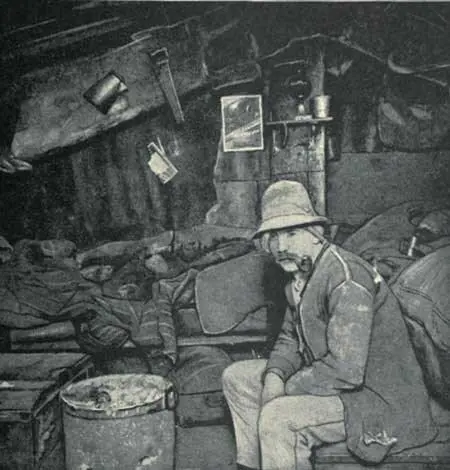
AN ITALIAN HOME UNDER A DUMP.
The partnership lasts as long as there is any profit in it, sometimes the better part of the week, during which time all work stops. If the feast panned out well, the next block is liable to be the scene of a rival celebration before the first is fairly ended. As the supply of Italian villages represented in New York is practically as inexhaustible as that of the saloons, there is no reason why Mulberry Street may not become a perennial picnic ground long before the scheme to make a park of one end of it gets under way. From the standpoint of the children there can be no objection to this, but from that of the police there is. They found themselves called upon to interfere in such a four days’ celebration of St. Rocco last year, when his votaries strung cannon fire-crackers along the street the whole length of the block and set them all off at once. It was at just such a feast, in honor of the same saint, that a dozen Italians were killed a week later at Newark in the explosion of their fireworks.
It goes without saying that the children enter into this sort of thing with all the enthusiasm of their little souls. The politician watches it attentively, alert for some handle to catch his new allies by and effect their “organization.” If it is a new experience for him to find the saloon put to such use, he betrays no surprise. It is his vantage ground, and whether it serve as the political bait for the Irishman, or as the religious initiative of the Italian, is of less account than that its patrons, young and old, in the end fall into his trap. Conclusive proof that the Italian has been led into camp came to me on last St. Patrick’s Day through the assurance of a certain popular clergyman, that he had observed, on a walk through the city, a number of hand-organs draped in green, evidently for the occasion.
Читать дальшеИнтервал:
Закладка:
Похожие книги на «The Children of the Poor»
Представляем Вашему вниманию похожие книги на «The Children of the Poor» списком для выбора. Мы отобрали схожую по названию и смыслу литературу в надежде предоставить читателям больше вариантов отыскать новые, интересные, ещё непрочитанные произведения.
Обсуждение, отзывы о книге «The Children of the Poor» и просто собственные мнения читателей. Оставьте ваши комментарии, напишите, что Вы думаете о произведении, его смысле или главных героях. Укажите что конкретно понравилось, а что нет, и почему Вы так считаете.
